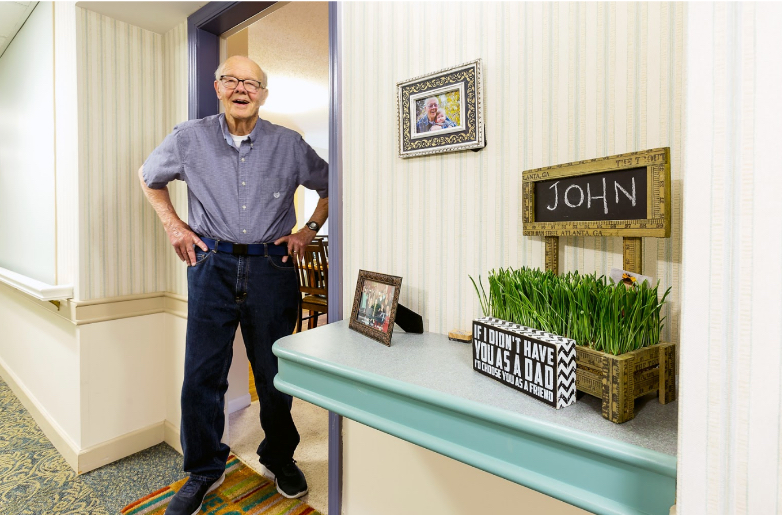The Impact of Personalized Memory Care on Mental Wellness
The Impact of Personalized Memory Care on Mental Wellness
Blog Article
Discovering the Relevance of Memory Treatment Solutions in Small Memory Treatment Residences
Memory treatment solutions play an essential role in boosting the lives of people with cognitive problems. In tiny memory treatment homes, the focus shifts to individualized care customized to each local's special requirements. These intimate settings promote much deeper connections and a supportive community. The inquiry stays: how do these atmospheres specifically add to the psychological well-being of both residents and their family members? Comprehending this vibrant exposes truth worth of specialized memory care.
Comprehending Memory Treatment and Its Relevance
Memory treatment is an important part in resolving the special needs of people with cognitive disabilities, such as mental deterioration and Alzheimer's condition. This customized type of treatment focuses on developing a secure and encouraging setting tailored to the obstacles faced by these people. Memory treatment facilities use trained team that comprehend the complexities of cognitive decrease, offering customized care that advertises dignity and respect.Activities and regimens are made to stimulate memory retention and cognitive function while ensuring security and security. In addition, memory treatment highlights social interaction, which can relieve feelings of seclusion and improve psychological health. By promoting a structured environment, individuals can navigate their lives with more confidence. Understanding the significance of memory care exposes its duty in boosting lifestyle, allowing people to maintain as much freedom as possible while receiving the assistance they need.

The Advantages of Smaller Sized Memory Care Homes
Smaller memory treatment homes use a more intimate setting that can considerably enhance the quality of take care of locals. With fewer homeowners, employee can develop stronger connections, fostering trust and emotional connections. This individualized interest often brings about enhanced interaction, making it less complicated for caregivers to understand and satisfy the special needs of each homeowner. On top of that, smaller environments normally decrease distractions and stressors, advertising a soothing atmosphere for memory retention and psychological well-being. The layout of smaller sized homes often urges socialization among homeowners, permitting purposeful interactions that can fight feelings of seclusion. Furthermore, these homes can adapt extra swiftly to adjustments in care requirements, guaranteeing that locals obtain prompt assistance. Overall, the tailored focus, decreased tension, and enhanced social possibilities found in smaller sized memory treatment homes create a nurturing environment that supports both cognitive feature and psychological health and wellness
Personalized Care Plans for Individual Demands
Personalized treatment plans are vital in addressing the one-of-a-kind needs of people in memory care. These plans often include tailored support approaches that enhance daily living and advertise well-being. Furthermore, customized task interaction aids citizens get in touch with their passions, promoting a sense of purpose and happiness.
Tailored Assistance Strategies
When developing customized assistance methods in memory treatment services, comprehending the distinct requirements of each person is essential. These strategies involve developing personalized treatment strategies that cater to the particular requirements, choices, and abilities of citizens. By reviewing cognitive feature, psychological well-being, and physical health and wellness, caretakers can create reliable interventions that promote comfort and freedom - small memory carehomes Charlotte. This personalized method warranties that each homeowner gets proper support, boosting their lifestyle. Routine assessments and modifications to these plans are important, as they allow caretakers to respond proactively to changing requirements. Additionally, involving relative in the planning procedure fosters a collaborative setting, enhancing the assistance network for individuals with memory obstacles. Inevitably, tailored support approaches are essential for supplying effective and compassionate memory treatment
Individualized Task Involvement
Producing meaningful engagement with individualized activities is crucial in memory treatment services. Memory treatment homes prioritize individualized care plans that cater to the special needs and preferences of each resident. These strategies commonly include tasks customized to locals' rate of interests, abilities, and cognitive degrees, boosting their feeling of function and self-respect. By integrating familiar routines, pastimes, and social communications, caretakers can boost cognitive function and emotional well-being. Personalized task involvement not just promotes an encouraging setting but also encourages residents to keep their freedom. The active participation in these customized tasks can lead to boosted state of mind and reduced stress and anxiety, enhancing the value of a holistic strategy in memory care that acknowledges each person's journey and one-of-a-kind experiences.
Developing a Supportive Community Environment
While cultivating a helpful community setting is vital for those with memory care needs, it calls for willful style and thoughtful involvement. Creating such a setting involves a mix of physical space and interpersonal connections. Tiny memory care homes can profit significantly from formats that motivate social interaction, such as open common locations and cozy celebration rooms. These styles promote a sense of belonging and protection for residents.Moreover, team member play a necessary role in cultivating this environment. Training caretakers to focus on compassion and active listening promotes and enhances relationships trust fund. Additionally, entailing family members in care plans and area activities can strengthen bonds and develop a network of assistance.
Enhancing Social Engagement and Activities
Reliable social engagement and activities are necessary for boosting the well-being of residents in memory treatment homes. These communications not only cultivate a sense of belonging but likewise stimulate cognitive functions, which can positively affect memory retention. Small memory treatment homes typically provide customized programs tailored to the unique interests and capabilities of each citizen, enabling even more significant and reliable engagement.Activities such as art treatment, songs sessions, and group video games encourage citizens to get in touch with each other, advertising relationships and lowering sensations of isolation. Additionally, including exterior tasks, such as horticulture or nature strolls, can enhance state of mind and overall health.These enriching experiences help locals preserve a feeling of purpose and pleasure in their lives. By developing an atmosphere that focuses on social interaction, small memory treatment homes considerably contribute to the emotional and emotional health of their residents, guaranteeing they feel valued and supported in their trip.
Supporting Families Through the Trip
As families browse the difficulties of caring for an enjoyed one with memory problems, the support offered by small memory treatment homes becomes vital. small memory carehomes Charlotte. These homes supply not just specialized take care of locals yet additionally important resources for family members. By promoting a collaborative environment, small memory treatment homes encourage open interaction, permitting families to reveal problems and share experiences.Support teams and instructional workshops are often readily available, furnishing families with knowledge and methods to handle the intricacies of amnesia. Such initiatives help in reducing feelings of seclusion, as families link with others dealing with similar situations.Moreover, tiny memory care homes typically provide individualized updates on residents' health, easing households' concerns and helping them feel associated with their liked one's life. This alternative technique to sustain not just enhances the high quality of take care of locals however also empowers families throughout their psychological trip
The Effect of Specialized Personnel Educating on Treatment Top Quality
In little memory care homes, the high quality of treatment is exceptionally affected by the training and knowledge of the personnel. Specialized training equips caretakers with crucial abilities to comprehend and deal with the one-of-a-kind needs of homeowners with memory disabilities. Understanding of dementia-related habits, reliable communication strategies, and person-centered treatment methods boosts the ability of personnel to develop an encouraging environment.Moreover, qualified staff are much better prepared to handle challenging scenarios, reducing the likelihood of problems and ensuring a calmer ambience. This training fosters a much deeper emotional connection in between caretakers and homeowners, advertising depend on and improving overall wellness. Additionally, specialized training can lead to greater work satisfaction among caretakers, minimizing turn over rates and offering continuity of look after citizens. Ultimately, the investment in team education and learning noticeably boosts the requirement of treatment, which is vital for boosting the top quality of life for individuals in small memory care homes.

Often Asked Concerns
Exactly how Do I Select the Right Memory Care Home for My Enjoyed One?
Choosing the appropriate memory care home involves examining individual needs, seeing facilities, examining team experience, comprehending care choices, taking into consideration place, contrasting costs, and looking for recommendations. Each element plays a critical duty in ensuring optimal treatment.
What Is the Cost Difference In Between Big and small Memory Treatment Facilities?
The price difference in between big and small memory treatment centers can differ substantially. Usually, little homes may use more individualized care at a greater per-person price, while larger facilities typically offer more features at a reduced total cost.
How Frequently Can Families Check Out Their Loved Ones in Memory Treatment Homes?
Family members can typically visit their enjoyed ones in memory care homes as frequently as wanted, with numerous facilities motivating routine visits to keep connections and support psychological well-being, though particular plans may differ by home.
What Certain Activities Are Used in Small Memory Treatment Homes?
Little memory treatment homes generally supply tasks like crafts and arts, music therapy, horticulture, exercise classes, and cognitive games. These activities are developed to engage residents, promote their minds, and promote social interaction amongst them.
Are There Any Kind Of Age Restrictions for Citizens in Memory Care Facilities?
Age constraints for homeowners in memory treatment facilities generally differ by area and specific facility policies. Typically, these homes satisfy older adults, often requiring citizens to be at the very least 55 or 60 years old. In small memory care homes, the focus shifts to individualized care tailored to each resident's special demands. Memory treatment facilities employ experienced personnel that comprehend the intricacies of cognitive decrease, providing personalized care that promotes dignity and routines and respect.activities are created to promote memory retention and cognitive feature while guaranteeing safety and security and security. Smaller sized memory care homes supply an even more intimate setup that can considerably improve the high quality of care for locals. Memory care homes prioritize personalized care plans that cater to the distinct requirements and choices of each resident. As boutique memory care family members navigate the challenges of caring for a loved one with memory disability, the support supplied by small memory care homes becomes vital.
Report this page